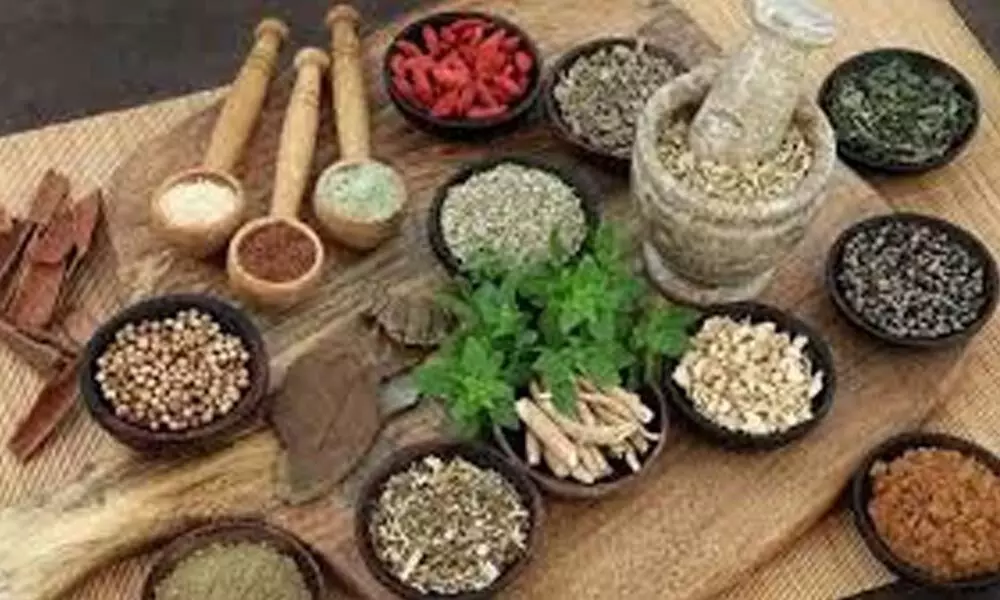Live
- Rajmata Jijabai Trophy: Manipur move to top of the table, T.N register first win
- Italian envoy Baroli hoping to strengthen ties with India through football
- CPI-M revokes suspension of Bengal party leader accused of sexual harassment
- Rachakonda Commissioner Emphasizes Health and Education at Uniform Diet Launch
- BJP leader visits late ASI Surendra Singh in Rajasthan, assures full govt support
- PM Modi tears into Gandhi family for its habit of amending Constitution
- Young Kabaddi Player Dies of Heart Attack During Match in Mandya
- Exciting Return of Santosh Trophy Football Tournament Kicks Off in Hyderabad
- Head Constable Dies by Suicide, Cites harssament by wife and inlaws
- Delhi BJP claims AAP govt will never pay women allowance like in Punjab
Just In
Ayurveda institute incorporates allopathy to treat Covid patients


Ayurveda institute incorporates allopathy to treat Covid patients
Amid a controversy over Yoga guru Ramdev's remarks on allopathy and doctors, the head of the government-run All India Institute of Ayurveda (AIIA) has said the facility has successfully treated at least 600 Covid patients by implementing both the systems of medicine.
New Delhi: Amid a controversy over Yoga guru Ramdev's remarks on allopathy and doctors, the head of the government-run All India Institute of Ayurveda (AIIA) has said the facility has successfully treated at least 600 Covid patients by implementing both the systems of medicine. Prof Tanuja Nesari said a holistic approach and the integration of ayurveda, allopathy and modern diagnostic technology made it possible.
Patients with mild to moderate symptoms are provided treatment at a Covid health centre in the Central government-run institute. According to the Delhi government's 'Delhi Corona' application, the facility currently has 47 oxygen beds, all of them vacant. The All India Institute of Ayurveda was inaugurated by Prime Minister Narendra Modi in October 2017. It has a 200-bed referral hospital for facilitating clinical research, 25 specialty departments and 12 clinics with eight inter-disciplinary research laboratories. "Pure ayurvedic treatment was provided to more than 94 percent of the patients, but allopathy was used wherever required as per the guidelines of the Indian Council of Medical Research. That's the reason for our success... We have adopted a holistic and integrated approach," Prof Nesari, an MD in Ayurvedic Pharmacology, told PTI. Of the 600 patients, around 200 were admitted during the second wave, she said.
"The best part is that ayurveda and allopathy coexist here. Be it ayurvedic or allopathic, the treatment is guided by tests conducted in laboratories," she said. "We do not administer any medication blindly. We closely monitor each and every case. This is a modern facility. We have pathology and radiology laboratories. We conduct CT scans, CRP and D-dimer tests regularly," said Prof Nesari, who has in the past worked as CEO of the National Medicinal Plant Board. Which patients need what kind of treatment is jointly decided by doctors of ayurveda and allopathy. In moderate cases, both ayurvedic and allopathic medications are used, she said. "First, we give ayurvedic treatment along with oxygen therapy. If the patient's condition doesn't improve, we take the help of allopathy, which involves the use of steroids etc, according to the ICMR guidelines," Prof Nesari said.
The institute has 40 ayurveda doctors and five allopathic doctors. The facility has an ICU, too, and doctors from AIIMS and Rajiv Gandhi Super Specialty Hospital provide online consultation, if required. "For example, they tell our doctors what they need to do immediately if the oxygen saturation level drops suddenly. Serious cases are referred to AIIMS and RGSSH," the director said. The AIIA referred one to two percent of its patients to these tertiary care facilities, she added.
The average length of stay at the facility is nine to 10 days. Hospitals have reported that a Covid patient with moderate symptoms remains admitted for 10-14 days, while a severe patient may have to spend up to a month due to dependence on medical oxygen. The director said doctors regularly monitor the oxygen saturation level of patients. Based on test results, pranayama and prone positioning are advised in some cases to increase oxygen saturation levels, she said. Ayurvedic medicines including Suvarnakalpa, Swas Chintamani, Swarna Bhupati are used in case of an emergency, too, and the results have been encouraging, she said. The treatment schedule for patients includes prayers, yoga, meditation, ayurvedic interventions, gargling, light exercise and ayurvedic medicine, approved by the Ministry of Ayush.

© 2024 Hyderabad Media House Limited/The Hans India. All rights reserved. Powered by hocalwire.com






